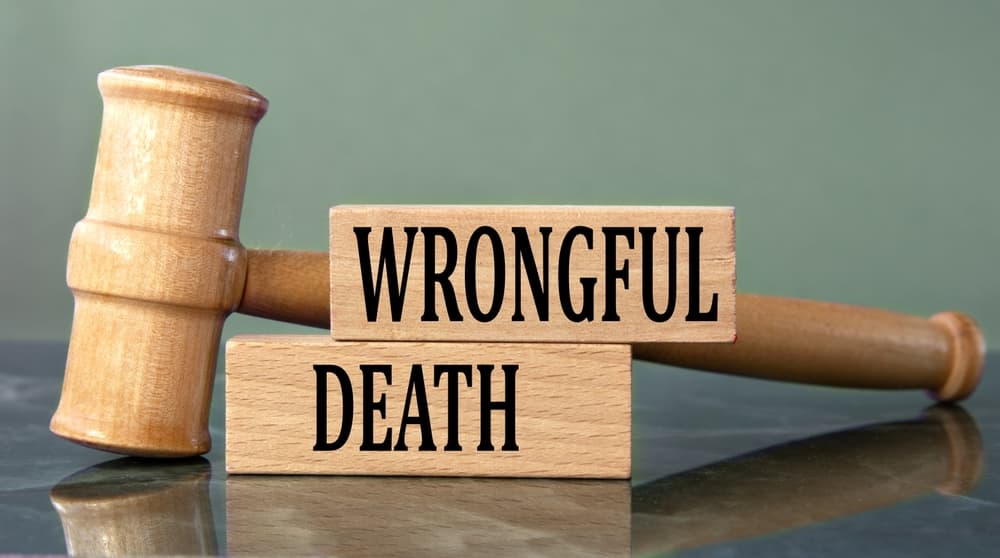If you have lost a loved one due to someone else’s negligent, intentional, or wrongful act, retaining an experienced wrongful death attorney can be vital.
First, a knowledgeable personal injury lawyer understands the complicated legal processes involved in wrongful death claims and can navigate the challenges on your behalf. They will also gather evidence, establish liability, and pursue justice and fair compensation for both you and your family. Moreover, an attorney can handle all settlement negotiations with insurance companies and, if necessary, litigate your case in court.
Having legal representation can provide the support and guidance you need during this difficult time, allowing you and your family to focus on healing.
How Do Wrongful Death Claims Arise?
Wrongful death claims arise when an individual dies due to the negligence, intentional actions, or wrongful conduct of another party. Surviving family members, dependents of the deceased, or personal representatives of the deceased’s estate pursue these claims, seeking justice and compensation for their loss. There are several common categories of wrongful death claims, each with its unique circumstances.
- One prevalent type of wrongful death claim involves car accidents. When a driver behaves negligently – such as by speeding, driving under the influence, or engaging in distracted driving – fatal accidents can occur. In these cases, the family of the deceased can file a claim against the at-fault driver to recover damages, including funeral expenses, lost income, and emotional suffering.
- Another common category is wrongful death claims stemming from pedestrian or bicycle accidents. These incidents often result from drivers failing to yield or obey traffic signals. When a vehicle strikes a pedestrian or cyclist, the consequences can be catastrophic, leading to fatalities. Families may seek justice by holding the negligent driver accountable.
- Wrongful death claims can also arise from incidents involving premises liability. This occurs when a property owner fails to maintain safe conditions, leading to accidents that result in death. For example, if a person dies due to a slip and fall on an icy walkway that the property owner neglected to clear, the family may file a claim against the property owner for negligence.
- Additionally, wrongful death can result from incidents involving intentional acts, such as assault or homicide. In cases where one individual intentionally causes harm that leads to death, the victim’s family can pursue a wrongful death claim against the perpetrator. This type of claim is often pursued in conjunction with criminal charges, as it seeks financial compensation for the loss of life and the emotional toll on the surviving family members.
- Lastly, wrongful death claims may arise from situations involving vehicular homicide or DUI-related fatalities. When a driver causes an accident while under the influence of drugs or alcohol, they may be held responsible for the resulting death. Families can seek compensation for their losses, including the deceased’s potential future earnings and the emotional effect of their death.
These claims provide a means for families to seek justice and compensation for their devastating losses.
Proving a Wrongful Death Case
To successfully pursue a wrongful death claim or lawsuit, certain legal elements must be satisfied. These elements establish the foundation of the case and must be proven to hold the responsible party accountable for the loss of life.
- Duty of Care – The first element involves demonstrating that the at-fault party (the defendant) had a legal duty to act with care toward the deceased. This duty can arise in various contexts, such as a driver’s responsibility to obey traffic laws or a property owner’s obligation to maintain safe conditions for visitors. If the defendant failed to uphold this duty, it may form the basis for a wrongful death claim.
- Breach of Duty – After establishing that a duty of care existed, the next step is to show that the defendant breached this duty. A breach occurs when a person’s actions (or lack thereof) fall short of the standard of care expected in a similar situation. For instance, if a driver was texting while driving and caused an accident, this behavior could be seen as a breach of duty. Evidence, such as police reports or witness testimony, can establish this breach.
- Causation – The third element requires proving that the defendant’s breach of duty directly caused the individual’s death. This means that the wrongful act must be linked to the fatal outcome. In legal terms, causation is often divided into two parts: actual cause (the direct cause of death) and proximate cause (whether the death was a foreseeable result of the defendant’s actions). Establishing this connection is essential for a successful claim.
- Damages – Finally, the claim must demonstrate that the surviving family members suffered damages as a result of the wrongful death. Damages can include a variety of financial losses, such as funeral expenses, lost income, and medical bills. Additionally, families may seek compensation for emotional suffering and loss of companionship. Documenting these damages through bills, pay stubs, and personal testimony is important for strengthening the case.
Each element plays a critical role in building a strong case, allowing families to seek the justice and compensation they deserve for their tragic loss.
How Can a Wrongful Death Lawyer Help?
A knowledgeable wrongful death attorney plays an important role in helping families navigate the complicated legal process following the tragic loss of a loved one. Their legal skill can significantly affect the outcome of a wrongful death claim or lawsuit. Here are several ways a skilled attorney can assist:
- Understanding the Legal Framework – Wrongful death laws vary by state, and an experienced attorney understands the specific statutes and regulations that apply. They can explain the legal rights of surviving family members and the steps required to file a claim. This guidance is important for ensuring that families comply with deadlines and other legal requirements.
- Conducting Thorough Investigations – A wrongful death attorney will conduct a comprehensive investigation into the circumstances surrounding the death. They gather evidence, interview witnesses, and consult experts if necessary. This thorough investigation helps to establish liability and strengthens the case by providing compelling evidence to support the claim.
- Establishing Liability – Proving that another party is legally responsible for the death is necessary in a wrongful death case. An experienced attorney knows how to gather and present evidence effectively to establish duty of care, breach of that duty, causation, and damages. Their ability to connect these elements can significantly improve the chances of a successful outcome.
- Negotiating with Insurance Companies – Dealing with insurance companies can be challenging – especially during a time of grief. A knowledgeable attorney acts as a buffer between the family and the insurer, negotiating on their behalf. They understand common tactics that insurance adjusters use to minimize payouts and can effectively counter these strategies to secure fair compensation.
- Calculating Damages – Determining the appropriate amount of damages to seek is complicated. A wrongful death attorney can assess the financial and emotional losses the family has incurred, including funeral expenses, lost income, and pain and suffering. By accurately calculating these damages, the attorney can work to ensure that the claim reflects the full extent of the family’s losses.
- Representing in Court – If a fair settlement cannot be reached through negotiation, a wrongful death attorney is prepared to take the case to court. They will represent the family’s interests, presenting evidence and arguments effectively to persuade the judge or jury. Their courtroom experience can be invaluable in achieving a favorable verdict.
Litigating a Wrongful Death Claim
Wrongful death litigation begins with filing a lawsuit in the appropriate court system. This process typically unfolds in several key stages, ultimately leading to a trial or an alternative dispute resolution proceeding.
- Filing the Lawsuit – The first step is to file a wrongful death lawsuit, often referred to as a complaint, with the court. This document outlines the details of the case, including the parties involved, the circumstances of the death, and the legal basis for the claim. It also specifies the damages sought by the claimants – typically the deceased’s surviving family members. The complaint must be served on the defendant, formally notifying them of the legal action.
- Defendant’s Response – After receiving the complaint, the defendant has a specified period, usually 30 days, to respond. They may file an answer, admitting or denying the allegations, or they might file a motion to dismiss the case if they believe it lacks merit. If the case proceeds, the defendant’s response sets the stage for the next steps.
- Discovery Phase – Following the defendant’s response, the litigation enters the discovery phase. This critical period involves both parties exchanging information and evidence relevant to the case. Discovery methods include written interrogatories, requests for documents, and depositions, where witnesses provide sworn testimony. This phase can take several months and is essential for building a strong case.
- Settlement Negotiations – During and after the discovery phase, the parties may engage in settlement negotiations. Many wrongful death cases are resolved through settlements, avoiding the need for a lengthy trial. The claimants, through their attorney, may present a settlement demand to the defendant or their insurance company. If both parties can agree on a compensation amount, a settlement is reached, and the case concludes without going to trial.
- Trial Preparation – If a settlement cannot be reached, the case will proceed to trial. Both sides will prepare by organizing evidence, developing legal strategies, and identifying witnesses. The attorney will craft a compelling narrative to present to the judge or jury.
- Trial or Alternative Dispute Resolution (ADR) – The case culminates in either a trial or an ADR proceeding, such as mediation or arbitration. During a trial, both parties present their arguments, evidence, and witness testimonies. A judge or jury will then decide the case based on the evidence presented. In ADR, a neutral third party helps facilitate discussions to reach a mutually acceptable resolution, potentially saving time and costs associated with a trial.
Common Wrongful Death Damages
 In a wrongful death claim or lawsuit, families who have lost a loved one due to someone else’s negligence can seek compensation for their various losses. This financial recovery helps address the emotional and economic effects of the loss. Here are some of the most common losses for which families can seek compensation:
In a wrongful death claim or lawsuit, families who have lost a loved one due to someone else’s negligence can seek compensation for their various losses. This financial recovery helps address the emotional and economic effects of the loss. Here are some of the most common losses for which families can seek compensation:
- Funeral and Burial Expenses – One of the first financial burdens families face after a loved one’s death is the cost of funeral and burial services. This can include expenses for the casket, burial plot, memorial services, and any associated costs. Families may recover these expenses as part of their claim.
- Medical Expenses – If the deceased received medical treatment prior to their death due to an injury resulting from the wrongful act, families may be able to recover medical expenses. This can include hospital bills, surgery costs, and any other medical treatments that were necessary due to the injury.
- Lost income and Benefits – If the deceased was the primary breadwinner, the family may face significant financial hardships. Compensation can include the lost income that the deceased would have earned had they lived. This can also cover benefits, such as health insurance or retirement contributions.
- Loss of Companionship – Families can claim compensation for the emotional loss of their loved one. This includes loss of companionship, guidance, and affection. It recognizes the profound emotional effect that a loved one’s death has on surviving family members.
- Pain and Suffering – Although more challenging to quantify, families can sometimes recover compensation for the pain and suffering that the deceased individual experienced before their death. This compensation acknowledges the physical pain and emotional distress they endured due to the wrongful act.
- Loss of Inheritance – In some cases, families may recover damages related to the inheritance they would have received had the deceased lived. This considers what the deceased would have contributed to the family’s financial future.
- Punitive Damages – In cases where the defendant’s actions were particularly reckless or intentional, the court may award punitive damages. These damages are intended to punish the wrongdoer and deter similar behavior in the future.
Speak to a Knowledgeable Wrongful Death Lawyer Today
If you recently lost a loved one because of someone else’s wrongful or careless behavior, you are not alone. A skilled and compassionate personal injury attorney can determine your options and work hard to maximize the compensation that you and your family receive as part of a claim or lawsuit.


